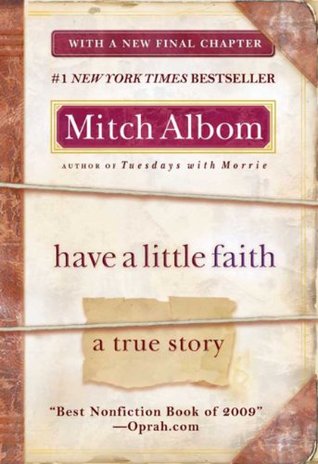More on this book
Community
Kindle Notes & Highlights
So he began with the first chapter of Genesis, broke it down to the simplest of ideas and related them to everyday life. He asked questions. He took questions. And a new style was born.
“Mitch,” he said, “faith is about doing. You are how you act, not just how you believe.”
I still didn’t get it. I was one of those disappointing congregants. Why had he chosen me to be part of his death, when I had probably let him down in life?
How do you not get cynical? He stopped. “There is no room for cynicism in this line of work.” But people are so flawed. They ignore ritual, they ignore faith—they even ignore you. Don’t you get tired of trying?
“Mitch, that’s what faith is. If they spit in your face, you say it must be raining. But you still come back tomorrow.” He smiled. “So, you’ll come back, too? Maybe not tomorrow…”
Maybe the faith didn’t mean that much to me, but it did to him, you could see how it put him at peace. I didn’t know many people at peace.
He had a way of looking you in the eye and making you feel the world had stopped and you were all that was in it. Maybe this was his gift to the job. Or maybe it was the job’s gift to him.
But, Mitch, we were part of each other’s lives. If someone was about to slip, someone else could catch him.
“She saw a man suffering. She didn’t want him to be alone.” She had a lot of guts. “Yes,” he said. “And a lot of love.”
And because metro Detroit boasts the largest Arab population outside of the Middle East, Muslim issues were a regular part of life, including a debate over a local mosque broadcasting Adhan, the daily call to prayer, in a largely Polish neighborhood that already rang with church bells.
“Our faith tells us to do charitable acts and to aid the poor in our community,” he said. “That is being righteous, no matter who you help.”
Soon we had tumbled into a most fundamental debate. How can different religions coexist? If one faith believes one thing, and another believes something else, how can they both be correct? And does one religion have the right—or even the obligation—to try to convert the other?
I remember one time a congregant came to me all upset, because her son, the only Jewish boy in his class, had been cast in the school’s Christmas play. And they cast him as Jesus. “So I went to the teacher. I explained the dilemma. And she said, ‘But that’s why we chose him, Rabbi. Because Jesus was a Jew!’”
Then why, I asked, is the world so fractured? “Well, you can look at it this way. Would you want the world to all look alike? No. The genius of life is its variety.
It’s like being a musician. If you found the note, and you kept hitting that note all the time, you would go nuts. It’s the blending of the different notes that makes the music.” The music of what? “Of believing in something bigger than yourself.”
How can you—a cleric—be so open-minded? I asked.
“Look. I know what I believe. It’s in my soul. But I constantly tell our people: you should be convinced of the authenticity of what you have, but you must also be humble enough to say that we don’t know everything. And since we don’t know everything, we must accept that another person may believe something else.”
If the only thing wrong with Moses is that he’s not yours; if the only thing wrong with Jesus is that he’s not yours; if the only thing wrong with mosques, Lent, chanting, Mecca, Buddha, confession, or reincarnation is that they’re not yours—well, maybe the problem is you.
When someone from another faith says, “God bless you,” what do you say? “I say, ‘Thank you, and God bless you, too.’” Really? “Why shouldn’t I?” I went to answer and realized I had no answer. No answer at all.
That there was nothing in being a Man of God that insulated him from the tears and misery of never being able to hold his little girl again.
Did you ever hear a sermon that felt as if it were being screamed into your ear alone? When that happens, it usually has more to do with you than the preacher.
“Maybe I have a little more to give,” he said. Or get. “When you give, you get,” he said.
Then why do we do so many bad things? He sighed. “Because one thing God gave us—and I’m afraid it’s at times a little too much—is free will. Freedom to choose. I believe he gave us everything needed to build a beautiful world, if we choose wisely. “But we can also choose badly. And we can mess things up something awful.”
The Reb once did a sermon on how the same things in life can be good or evil, depending on what, with free will, we do with them. Speech can bless or curse. Money can save or destroy. Science can heal or kill. Even nature can work for you or against you: fire can warm or burn; water can sustain life or flood it away. “But nowhere in the story of Creation,” the Reb said, “do we read the word ‘bad.’ God did not create bad things.”
“Because, from the beginning, God said, ‘I’m gonna put this world into your hands. If I run everything, then that’s not you.’ So we were created with a piece of divinity inside us, but with this thing called free will, and I think God watches us every day, lovingly, praying we will make the right choices.”


